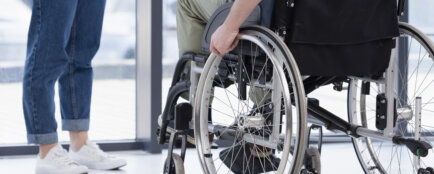What social rights do we have
Social rights are fundamental human rights. In practice, they are regulated by social security law. It is an area of law that deals with a system of legal norms and principles designed to organise and provide social protection to the population. This right is ensured mainly on the basis of:
- Social insurance: this is compulsory insurance that provides for persons in the event of adverse social events such as sickness, disability, old age, death or childcare. Social insurance is financed mainly by contributions from employees and employers.
Tip for article
Tip: Who has to pay social insurance, where and how much? And where does all this money go? That’s what we look at in the next article.
- Social assistance: This is for people who find themselves in a difficult life situation and cannot help themselves. This includes the provision of cash benefits, housing allowances or special social services. Social assistance is based on the principle of need.
- Social services: these include a wide range of services provided to people in need to ensure better social inclusion, support for independent living or help in specific life situations. These include, for example, drug centres, services for people with disabilities, homes for the elderly and others.
The role of the European Union
Social rights are granted to us by the state on the one hand, but also by the European Union on the other. The EU has agreed on the so-called European Pillar of Social Rights, which is to be implemented in the Member States by 2030. The main objective is to increase employment among people aged between 20 and 64 to at least 78%, to provide vocational training for at least 60% of people each year and to reduce the number of people at risk of poverty or social exclusion by at least 15 million. It is based on 20 core principles, which it divides into three categories:
Equal opportunities and access to employment
- Education, training and lifelong learning – Ensuring quality education and access to training for all.
- Gender equality – Ensuring equal opportunities and closing the gender pay gap.
- Equal opportunities – Combating discrimination on any grounds and promoting equal opportunities for all.
- Active employment promotion – Ensuring that people have access to high quality job offers, traineeships or apprenticeships.
Are you solving a similar problem?
Are you being discriminated against?
Have you experienced discrimination or other unlawful conduct in your job search or at work? Do you want to file a lawsuit and are not sure if you will win? We will assess your chances of success in court and suggest a solution that will lead to the desired outcome.
I want to help
- When you order, you know what you will get and how much it will cost.
- We handle everything online or in person at one of our 6 offices.
- We handle 8 out of 10 requests within 2 working days.
- We have specialists for every field of law.
Fair working conditions
- Safe and adaptable employment – Promoting safe and flexible employment contracts for workers.
- Wages – Ensuring fair wages that provide a decent living wage.
- Employment information and protection in the event of dismissal – The right to timely information on working conditions and protection in the event of dismissal.
- Social dialogue and worker participation – Promoting constructive dialogue between the social partners.
- Work-life balance – Promoting work-life balance.
- Healthy working time – Ensuring that working time allows for a healthy balance between work and leisure.
Social protection and inclusion
- Childcare and child support – Ensuring a high level of child protection and support for families.
- Social protection – Ensuring that everyone has access to social protection.
- Unemployment benefits – Support in finding a job and financial support in the event of job loss.
Tip for article
Tip: The Job Centre plays a key role in supporting you in your job search. What else the Job Centre can offer is discussed in our article.
- Minimum income – Ensuring a decent standard of living for those without sufficient resources.
- Older people and pensions – Ensuring a decent life for older people and adequate pensions.
- Healthcare – Ensuring access to quality healthcare for all.
- Inclusion of people with disabilities – Ensuring equal opportunities and independence for people with disabilities.
- Long-term care – Ensuring access to affordable and quality long-term care.
- Housing and anti-poverty – Promoting access to affordable housing and combating social exclusion and poverty.
- Occupational health and safety – Ensuring safe and healthy working conditions.
What is social exclusion
Despite the existence of these rights, there are problems of social exclusion in the Czech Republic. Social exclusion is defined as a process whereby individuals or groups are systematically excluded from society. These people are thus marginalised or excluded from society altogether.
Causes of social exclusion
The causes of social exclusion are complex and interrelated. They reflect a combination of individual, social, economic and political factors. The main causes include:
- Poverty and economic inequality: One of the main causes of social exclusion is economic inequality. This is because poverty limits access to basic resources, education, health care and housing, leading to social exclusion.
- Discrimination: Discrimination based on race, ethnicity, gender, sexual orientation, age, disability and other grounds can lead to restrictions in access to employment, education, health care and other social services.
- Lack of education: Limited access to quality education limits employment opportunities and economic growth, leading to further social exclusion.
- Unemployment and precarious employment: Unemployment or jobs with low wages and little social protection can lead to economic exclusion and limit access to social and health services.
- Disability: People with disabilities often face barriers to accessing employment, education and social services, leading to their social exclusion.
- Structural and political factors: Weaknesses in political, economic and social structures can cause or exacerbate social exclusion. This includes inadequate social protection policies, discriminatory laws and lack of participation of disadvantaged groups in decision-making processes.
- Migration and refugee: Migrants and refugees often face barriers in language, employment and social services, leading to their exclusion from society.
Tip for article
Tip: Did you get fired at work? We’ll make sure you get everything you’re entitled to in the event of termination. We can help you defend yourself against your employer. We will offer a solution in as little as two days, nationwide.
The consequences of social exclusion for individuals
- Impaired mental health: social exclusion can lead to feelings of anxiety, depression, low self-esteem and loneliness. These mental health conditions can have a long-term impact on overall quality of life.
- Impaired Physical Health: There is a strong correlation between social exclusion and health. Exclusion often leads to poorer health, including the development of chronic diseases and shorter life expectancy.
- Limitation of educational and employment opportunities: Social exclusion often prevents people from accessing education and employment, limiting their future prospects and potential for personal and professional growth.
- Social isolation: Social exclusion can lead to isolation from society and reduced social contact, making it difficult to form and maintain relationships and support networks.
- Increased poverty: Limited access to employment and social services can lead to financial instability and poverty, further exacerbating social exclusion.
- Non-participation in social and political life: People who are socially excluded often do not engage in social, political and civic activities, which reduces their ability to influence decisions and policies that directly affect their lives.
- Negative impact on self-actualisation and identity: Social exclusion can affect how individuals perceive themselves and their place in society.
- Interpersonal conflict and violence: In some cases, social exclusion can contribute to social tensions, conflict and even violence as individuals and groups struggle to combat perceived injustices.
Tip for article
Tip: Have you been a victim or witness to a crime and are considering filing a criminal complaint? We can advise you on how to proceed. We will protect your rights quickly, efficiently and profitably.
Consequences of social exclusion for society
- Social inequality and segregation: social exclusion increases the differences between social groups of people, leading to social inequality and segregation. This can lead to a division of society into ‘in’ and ‘out’ groups, between which there are different living conditions and opportunities.
- Increased levels of crime and social problems: Socially excluded groups are often forced to face difficult living conditions which can lead to higher levels of crime, drug addiction and other social problems. This has far-reaching implications for the safety and quality of life of the whole society.
- Economic costs: Social exclusion leads to lower levels of education, unemployment and poverty, which has a negative impact on the economy. Higher levels of social exclusion also typically lead to higher public spending on social welfare, health care and crime fighting. At the same time, it also reduces tax revenues and constrains economic growth.
- Loss of social capital and cohesion: social exclusion weakens social networks and relationships, reducing social capital and cohesion. This can lead to a weakening of trust and cooperation between people and, consequently, to an overall weakening of social cohesion and solidarity.
- Restrictions on innovation and growth: Limited access to education and economic opportunities for socially excluded groups hinders talent development and limits innovation and economic growth.
- Political instability and polarisation: Social exclusion can lead to radicalisation and polarisation, threatening political stability and democratic values. This can be particularly evident when excluded groups seek to express their discontent through protests or support for extremist political movements.
- Deterioration of public health: Social exclusion contributes to a wider range of health problems, including mental and chronic illnesses, which impacts on overall public health and increases overall healthcare costs.
Tip for article
Tip: In addition to social security, health insurance also plays an important role. Read how and how much we have to pay, and what happens if we don’t pay.
What is a socially excluded locality
A socially excluded locality is an area where a high number of people or groups suffering from social exclusion are concentrated. These localities are often characterised by low socio-economic status, high unemployment rates, low quality or overcrowded housing, limited access to education, healthcare and other basic services. These can be entire urban neighbourhoods, rural areas or segregated settlements.
How a socially excluded locality is created
The emergence of socially excluded localities can result from a variety of factors and processes, including:
- Economic decline: the loss of industrial jobs usually leads to mass unemployment and economic decline in certain areas. In our country, we have seen this with the closure of mines in the Ostrava region.
- Social segregation: Discrimination and segregation based on ethnicity, race, socio-economic status or other factors can lead to the isolation of certain groups in certain areas. An example is the Chánov housing estate near the town of Most.
- Urban planning and housing policies: Inadequate or poorly designed urban planning and housing policies can contribute to segregation and the creation of ghettos. Again, an example is the Chánov housing estate, which was built in 1977 to isolate Roma residents from the rest of the city.
- Migration and demographic change: the influx of migrants into certain areas without sufficient support and integration can also lead to the creation of socially excluded localities.
Consequences of socially excluded localities
Socially excluded localities have significant negative consequences for the people living in them. One of the main problems is limited access to basic services such as education, healthcare and employment, leading to social and economic isolation. Children and young people in these areas often face a greater risk of failure and low levels of education, which reduces their chances of a better future. In addition, lack of access to adequate housing and living environments can lead to poor health.
For society as a whole, socially excluded localities have long-term consequences, including increased spending on social services and health care. Social and economic segregation leads to the reinforcement of prejudices and stereotypes, which can cause tensions between different social groups. It also reduces social cohesion and integration, which can have a negative impact on social stability and economic development. The presence of excluded localities also reduces the overall quality of life in society and increases social inequality.
How the state addresses these problems
As announced in Chapter 1, the state combats social exclusion and the emergence of socially excluded areas through social security. Social insurance, which provides financial protection for individuals and their families in certain life situations that might otherwise threaten their economic stability, is therefore mainly used as a preventive measure.
Specifically, various types of benefits and allowances, such as old-age, orphan’s or disability pensions, unemployment benefits, sickness benefits, etc. In addition, there are also various benefits for material need. These include a subsistence allowance to cover basic living needs, a housing supplement for people with insufficient income and emergency aid, which is a one-off financial contribution for certain situations.
The state also has forms of assistance for existing cases of social exclusion. However, non-profit organisations are also a large part of this, and social service workers are at the centre of it all. This assistance seeks to address various aspects of social exclusion – from lack of housing, to unemployment, to lack of access to education and healthcare. These include:
- Social housing and hostels – These services provide temporary housing for people who find themselves homeless or living in substandard housing conditions. The aim is to provide a stable environment from which these people can begin to address other aspects of their situation. Shelters for mothers with children are a concrete example.
- Employment programmes – These are programmes that support the integration of socially excluded people into the labour market through retraining, courses and job search support.
- Outreach programmes – These services work directly in communities, where they try to establish personal contact with people living in socially excluded areas. They help address individual needs and provide information about available resources and services.
- Advice and support – This includes offering advice on law, debt, health, education and family relationships. The aim is to provide people with the information and tools needed to address their situation.
- Community centres and clubs – These are places that offer leisure activities, educational programmes and social services for children, young people and adults. These centres play a key role in building a sense of belonging and support within communities.
- Programs for specific groups – These are a variety of services targeted to the specific needs of certain groups such as families with children, seniors, people with disabilities, migrants and minorities.
Summary
Social rights are fundamental rights of every citizen, but their actual implementation may be limited in practice. This article focuses on the definition of social rights, the issue of social exclusion and the ways in which the state is trying to address this problem. Social rights include social insurance, social assistance and social services, which aim to protect citizens from social and economic risks. The European Union supports their strengthening through the European Pillar of Social Rights. Nevertheless, there is a problem of social exclusion in the Czech Republic, which mainly affects the poor, the unemployed, the disabled or discriminated groups. The causes of this phenomenon are multifaceted, including poverty, discrimination, lack of education or unstable employment. The state tries to address the situation through various measures such as employment support, social benefits or education and housing programmes.




